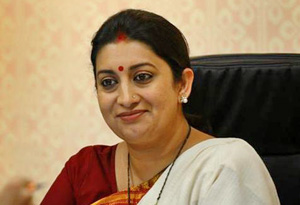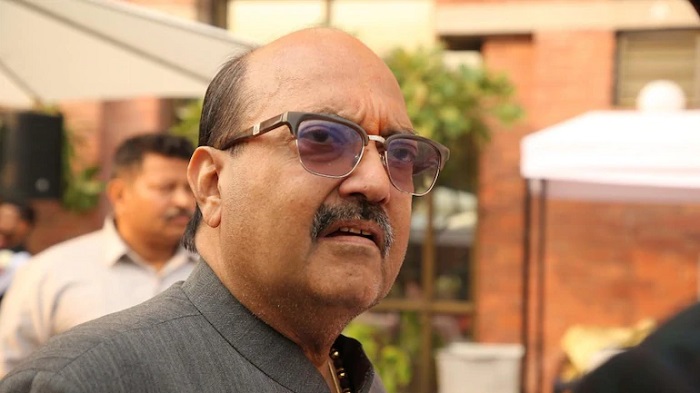New Delhi, Nov 23: Taking on her critics, Human Resource Development (HRD) Minister Smriti Irani today dismissed charges that education was being saffronised even as she turned down demands that Sanskrit be made compulsory in the curriculum.
"Those who accuse me of being a RSS mascot or RSS representative possibly want to deflect the attention from the good work that we have done... this agenda will be flagged and I will be whipped for as long as there is a need to keep attention diverted away from the good work. I am ready for it. I have no problem," she told journalists at the agency headquarters here.
Answering questions on the controversial decision to replace German with Sanskrit as the third language in some 500 Centrally-run Kendriya Vidyalayas, Irani said that teaching of German under an MoU signed in 2011 had been in violation of the Constitution. An investigation has already been launched to find out how the MoU came to be signed.
Responding to demands that Sanskrit be made a compulsory language, the minister said that the three language formula was very clear that any of the 23 Indian languages listed in Schedule 8 of the Constitution could be opted for.
But she reiterated that German will continue to be taught as a foreign language.
"...we are teaching French, we are teaching Mandarin, we teach German in the same way. For the life in me, I can't understand why people are not understanding what I am saying," she said.
Irani had earlier strongly defended the decision to replace German with Sanskrit as the third language, saying the existing arrangement was in violation of the Constitution.
Dismissing charges that efforts were being made to saffronise education, the Minister said she has never tried to explain herself on the "basis of secularism with respect to saffronisation in terms of education" while citing examples of choosing heads of institutions irrespective of their religion.
Irani said while rolling back the Four Year Undergraduate Programme of Delhi University, she never had in mind which region or religion they (the students) had come from.
In this context, she defended the decision to roll back the programme, saying the degrees offered had no "legal sanction".
"My endeavour is whatever I do should be done so that it is within law and favours the students", she asserted while rejecting the notion that education is being politicised in the country.
Talking about the moves to have a new national education policy, the deliberation of which would start next year, she said the exercise would be exhaustive in nature and involve all stakeholders, besides academicians and experts, who are directly impacted by it.
"For the first time, in the history of our nation, an initiative will be undertaken where the citizen will also be engaged on this policy because education policy when we arrive upon it will have an impact for generations.
"So to ensure that those who will be impacted most also considered in terms of their views...something which I am currently structuring within the Ministry", she said.
A methodology is being prepared wherein the stakeholders apart from private sector, academicians, institutional experts and policy experts could also be engaged in drafting the policy.
It will be deliberated upon in the Ministry and in Central Advisory Board of Education (CABE) which is the highest decision-making body on education in the country.
Irani said that during her interaction with students and parents the views that came forth were that they wanted more updated information about the syllabus and variety in choice of courses.
"They want to pick up some option, which are applicable and viable now, but also some options, which will prepare them for the future.
Asked about the demands for re-introduction of Class X board examinations, Irani merely said that the decision has to be take by CABE.
"The big policy decision will be taken on the platform like CABE and taken in conjunction with the states.
When her attention was drawn to fleecing of students by institutes whose degrees were not recognised, the Minister said that she will soon hold a special meeting to see what can be done.
"If there is belligerent violation, then I will explore what are the possibilities that a regulator can undertake," she said and quoted the Prime Minister that, "There is no shortage of law, but there was lack of implementation".
Queried about criticisms that none of the Indian universities find a place among the top 100 institutions in the world, she pointed that ranking agencies have their own parameters for evaluation.
Irani further asserted that India will have its own ranking system in place soon.
"In India we are actually evolving a ranking system for our institutions. Vice Chancellors, IIT Directors and everybody are sitting together to tell us how to rank ourselves," she said.
Allaying apprehensions that new IITs and IIMs would erode the brand of the existing elite institutions, Irani said, "We are ensuring enhancement of capacities and capabilities of our faculty and other resource besides infrastructure in IITs and IIMs."






Comments
Add new comment